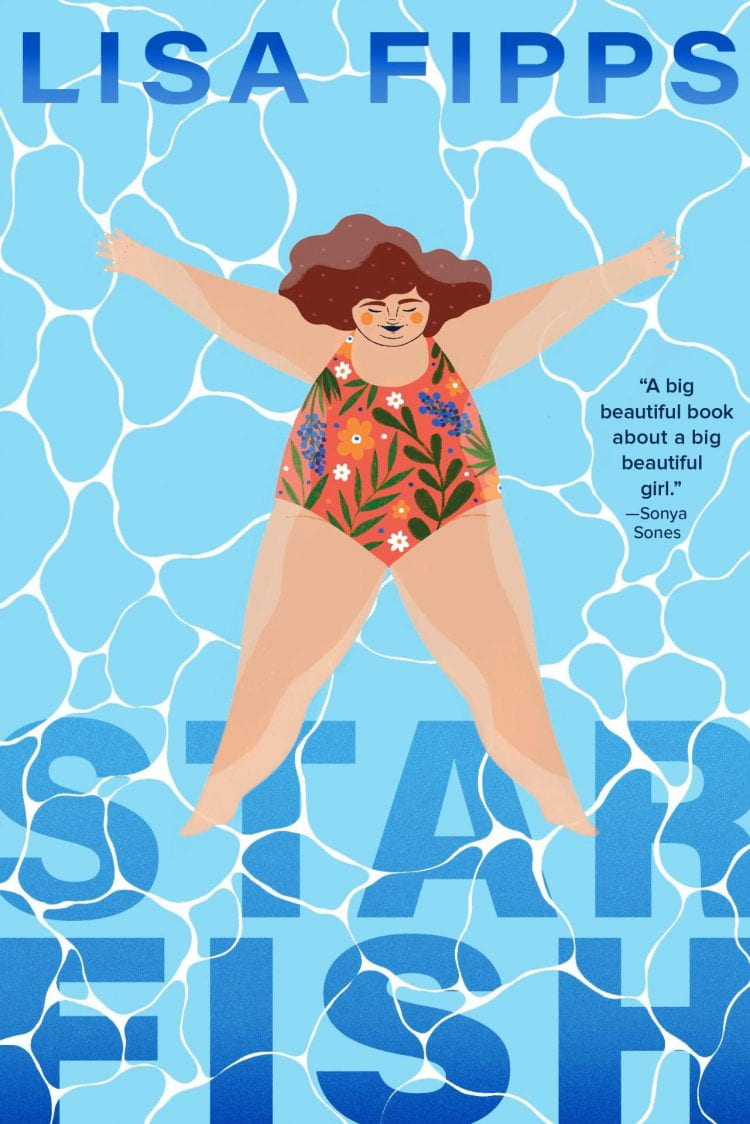Written by Lisa Fipps Reviewed by Erin Healy (2021-2022)
“But every time I try to stand up for myself,
the words get stuck in my throat,
like a giant glob of peanut butter.
Besides, if they even listened,
They’d just snap back,
‘If you don’t like being teased,
Lose weight.'”
If you have ever lived in a larger body in American society, the thought of pool parties may spike your anxiety or bring up unpleasant, if not traumatic, memories. This is true for Ellie Montgomery-Hofstein, in Lisa Fipps novel, “Starfish.”
Ellie is a 12 year old who is taunted and chastised by her peers, her mother, and society as a whole, for being fat. It all begins at her 5th birthday pool party when she wears a whale swimsuit and cannonballs into the pool, soaking all the bystanders and acquiring the nickname “Splash,” which follows her all the way to present day, middle school. Ellie works through learning the “unspoken rules” of what society says fat people should or should not do. These “rules” follow her everywhere: from the halls of school to the walls of her home. Ellie learns to follow these rules, shrink herself, and get by, until she starts to question….maybe her body isn’t the problem….maybe it’s society that needs to change…..maybe she deserves to be herself, love herself, and take up space….like a starfish.
This story urges society to reexamine its moral judgement on fatness and to love and respect all bodies regardless of their size. This story feels so important for older elementary/middle grade readers, especially those who have larger bodies, because although the media is slowly starting to show more representation of different bodies, there is still plenty of messaging that pushes the idea that only thin (white) bodies are something to be proud of or worthy of love. There are also hardly any children’s books that are fat positive narratives, opposed to fat positive informational body development books. For these reasons, I believe this book is a necessary addition to any upper-elementary/ middle school classroom library. I would, however, like to point out that of the few fat positive children’s books I was able to find, all of them had white female characters. We must continue to look for fat positive children’s literature with intersectionality. It is dire that students with multiple different identities along with being fat can see themselves represented and their identities uplifted. This book is not a finish line, but a jumping off point.

Erin, this is a well-written and very thorough review. I am excited to read this book! I’m glad you give such a detailed overview about the events in the novel and about its shortcomings. It’s true that fat-positive children’s literature is hard to find and even harder to find characters with intersectional identities. Like you said though, this is a great start!
I just read Starfish, too!!!!! What did you think of the discussion of bariatric surgery?
To your point about fat books not about white girls, one book that Alisun suggested to me is Beautifully Me by Nabela Noor. I haven’t read it yet but it’s not about a white girl! I also have the (other) F word on hold.
Also I don’t usually like novels written in verse, but I loved this one. What did you think of the form?
Thank you Lindsey, I am so excited to look into your suggestions! I was taken aback by the bariatric surgery references. That is something I wouldn’t really know how to discuss with elementary schoolers, but it is something to grapple with. I am actually partial to novels in verse, so yes I agree, I loved that about this book. ( If you enjoyed the style in this book, I suggest reading “The Dream House” by Carmen Maria Machad. It is NOT a children’s book but it is an amazing novel in verse)
Wow, I wish I had this book when I was a child. I love your point about the book being a jumping off point, and not a finish line. It is astounding how fat-phobic our society is–even amongst those who advocate for social justice.
I agree this book could be a good addition to a classroom library. I could see it providing a useful jumping off point for a conversation around thinking critically about how whiteness is treated as the default in children’s literature, Eurocentric beauty standards, how fatphobia is ultimately an expression of anti-Blackness, as well as body diversity and fat positivity in general. Thank you for the thoughtful review and including that bit of prose – it was wonderful to get a sense of the book this way.
Thank you for that introduction quote! It immediately drew my attention and made me want to hear more about this book. I think one of your final points about remembering intersectionality is so important. Intersectional body positivity is beautiful!
Wow, what an incredible book to use to talk about body image! I have never seen a picture book explicitly talking about self-image and esteem. Like you mentioned, I think this would be a phenomenal book to have in upper elementary school, middle ages. There are not enough conversations surrounding this topic. Thanks for reviewing this book and adding it to my list of “must-haves!”